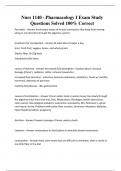Nurs 1140 - Pharmacology I Exam Study
Questions Solved 100% Correct
Peristalsis - Answer Involuntary waves of muscle contraction that keep food moving
along in one direction through the digestive system.
treatment for constipation - Answer At least 64oz of water a day
bran, fresh fruit, veggies, beans, and whole grains
Dietary fiber 20-25g daily
Scheduled toilet times
causes of diarrhea - Answer decreased fluid absorption - laxative abuse, mucosal
damage (Chron's, radiation, colitis, ischemic bowel dis.)
increased fluid secretion - infectious bacteria endotoxins, antibiotics, foods w/ sorbitol,
hormonal, adenoma of pancreas
motility disturbances - IBS, gastrectomy
causes of constipation - Answer Occurs when stool or waste moves too slowly through
the digestive tract (hard and dry), Diet, Medications, Blockages; bowel obstruction,
colon cancer, Neurological problems; autonomic neuropathy, MS, Parkinson's, spinal
cord injury, stroke, Problems with pelvic floor muscles, Hormone imbalance; diabetes,
hyper/hypothyroidism, pregnancy
diarrhea - Answer frequent passage of loose, watery stools
Laxatives - Answer medications or foods given to stimulate bowel movements
constipation - Answer Hard, slow stools that are difficult to eliminate; often a result of
too little fiber in the diet
,therapeutic drug monitoring for pregnant women - Answer A - safe for pregnancy
B - only animal studies, few studies in humans
C - animal studies show no adverse effects
D - adequate studies, though benefits outweigh risk
X - adequate, contraindicated in women who are or may become pregant
Reye's syndrome - Answer potentially serious or deadly disorder in children that is
characterized by vomiting and confusion
The 6 rights - Answer *Right patient
*Right Drug
*Right Dose
*Right route
*Right time
*Right documentation
medication error - Answer any preventable event that may cause or lead to
inappropriate medication use or patient harm while the medication is in the control of
the health care professional, patient, or consumer
Adverse drug event - Answer Any injury caused by a medication
OARRS - Answer Ohio Automated Rx Reporting System
controlled substances scheduling categories: III - V - Answer FDA approved, have some
potential for abuse and addiction but less than I and II (ex: xanax, adavan, coladopin)
,controlled substances scheduling category II - Answer Commonly given to patients but
has high potential for harm due to risks for abuse, dependency, addiction, withdrawal.
Highly regulated. (ex: dilatid, morphine)
controlled substances scheduling category I - Answer Illegal substances that are not FDA
approved. Cannot use for research and can never be given to patients. (ex: heroin,
cocaine)
polymorphisms - Answer Naturally occurring differences in form between members of
the same population
Therapeutic drug monitoring - Answer The process of measuring drug levels to identify a
patient's drug exposure and to allow adjustment of dosages with the goals of
maximizing therapeutic effects and minimizing toxicity.
Trough - Answer Lowest point of a wave
Carcinogenicity - Answer The ability of a drug to induce living cells to mutate and
become cancerous.
Tolerance - Answer A progressive decrease in a person's responsiveness to a drug.
Placebo - Answer A harmless pill, medicine, or procedure prescribed more for the
psychological benefit to the patient than for any physiological effect.
nocebo effect - Answer harm resulting from the mere expectation of harm
, placebo effect - Answer improvement resulting from the mere expectation of
improvement
gender-specific medicine - Answer A developing science that studies differences in the
normal function of men and women and addresses how people of each gender perceive
and experience disease.
HIPPA (Health Insurance Portability and Accountability Act) - Answer law that regulates
patient privacy and who we can give info to.
informed consent - Answer A process of communication between a patient and their
health care provider that often leads to an agreement or permission for care, treatment,
or services
Pharmacokinetics - Answer the study of drug movement throughout the body
Pharmacogenomics - Answer the study of how genetic inheritance affects the body's
response to drugs
narcotics - Answer drugs that get rid of pain and dull the senses
Malpractice - Answer Negligence by a professional person
controlled substances - Answer drugs that have the potential for abuse and
dependency, both physical and psychological
desired action - Answer expected response to a drug




